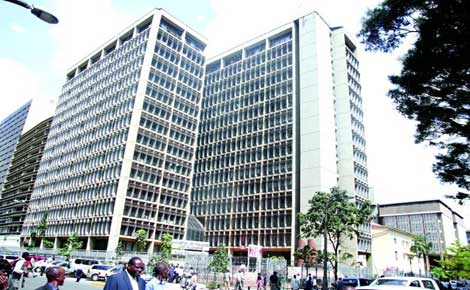 |
|
Ministry of Finance office in Nairobi, Kenya (PHOTO: File) |
Kenya's expanded appetite for expenditure in the last three years has depleted the fiscal buffers build during the last decade, a World Bank report has said.
The 2014 Public Expenditure Review titled, Decision Time: Spend More or Spend Smart, paints a picture of a government spending at a faster pace than its growing revenue. "There has been significant fiscal expansion during the last three years which has depleted the fiscal buffers built during the last decade. Kenya's overall expenditure reached 25.9 per cent of GDP in 2013/14," the report released yesterday says in part.
But what is set to hurt the country further, at a time when expenditure growth is outpacing growth in revenue is the narrow tax base that is concentrated on a few large tax payers.
The report notes that the country has a narrow tax base largely dependent on income taxes, which contribute 50 per cent of tax revenue as consumption taxes under perform generating 25.5 per cent of revenues.
This is a far cry from countries like Korea, Chile and South Africa whose income taxes account for six per cent, 7.5 per cent and 8.6 per cent of GDP respectively while consumption taxes account for higher contributions at nine per cent, 10.8 per cent and eight per cent of GDP respectively.
The large taxpayers office has 1,138 businesses, medium and small taxpayer office 331,066 businesses while medium and small taxpayer office has 6,527,058 individuals, it notes.
Value Added Tax (VAT) generates 25 per cent of total revenue while the rest is from excise and import duty. In addition, a decline in international trade taxes from about 2.5 per cent to about two per cent of GDP is expected as the economy opens up and the country implements international trade agreements.
Revenue averaged 18 per cent of GDP hence fiscal expansion has been achieved through debt. Total revenue has recorded slow growth rising by only 0.6 percentage points from 18.8 per cent of GDP in 2012/13 to 19.4 per cent in 2013/14).
Expenditure on the other hand, increased by 1.1 percentage points in the same period resulting to the government's reliance on borrowing to finance the budget deficit. Fiscal deficit (including grants) continued to worsen, from 4.5 per cent of GDP in 2011 to 6.2 per cent in 2013).
The deficit was financed through a combination of domestic and external borrowing. Domestic borrowing increased from 1.6 per cent of GDP in 2011to 4 per cent in 2013. Foreign financing on the other hand rose from 1.4 per cent of GDP in 2012to 2.1 per cent in 2013/14. The heavy domestic financing has seen a commensurate increase in debt service. For instance, domestic debt doubled from Sh521 billion in June 2009 to Sh1 trillion in June 2013.
Public debt increased from 38 per cent of GDP in 2012 to 43 per cent in 2013. Despite the increase, the report says most of the indicators remain favourable since the debt remains below the fiscal anchor threshold of 45 per cent of GDP.
The report notes that this debt remains within sustainable limits and finds no evidence of crowding out the private sector from the credit market. However, some of the proceeds from the recent Eurobond Sh176 billion ($2 billion) will retire some of the expensive domestic debt to provide reprieve.
The recent expansion emanates from devolution which has seen a quick build-up of administrative expenses, increased security spending and the roll out of new flagships contained in the Jubilee manifesto and the rising wage bill.
Revenue performance averaged 17.6 per cent of GDP in 2011/12 to 2013/14. Nevertheless, the composition of spending reflects commitment to fund infrastructure but the low execution of infrastructure projects undermines its potential impact.
The report notes that while the Government's expansionary fiscal policy has increased opportunities for growth, it has however constrained public expenditure management, particularly in the allocation and utilisation of resources.
Stay informed. Subscribe to our newsletter
 The Standard Group Plc is a
multi-media organization with investments in media platforms spanning newspaper
print operations, television, radio broadcasting, digital and online services. The
Standard Group is recognized as a leading multi-media house in Kenya with a key
influence in matters of national and international interest.
The Standard Group Plc is a
multi-media organization with investments in media platforms spanning newspaper
print operations, television, radio broadcasting, digital and online services. The
Standard Group is recognized as a leading multi-media house in Kenya with a key
influence in matters of national and international interest.
 The Standard Group Plc is a
multi-media organization with investments in media platforms spanning newspaper
print operations, television, radio broadcasting, digital and online services. The
Standard Group is recognized as a leading multi-media house in Kenya with a key
influence in matters of national and international interest.
The Standard Group Plc is a
multi-media organization with investments in media platforms spanning newspaper
print operations, television, radio broadcasting, digital and online services. The
Standard Group is recognized as a leading multi-media house in Kenya with a key
influence in matters of national and international interest.









